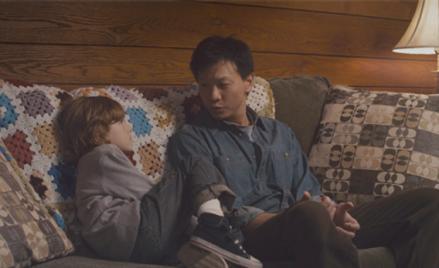One of the principal joys of Ebertfest is its untimeliness. At what other 2013 festival would I get to catch a self-distributed 2011 movie that, had I seen it upon release, would have certainly made my list of the best films of that year? Patrick Wang’s In the Family is quite simply an astonishment—all the more so because it’s the director’s first film, a debut feature from an MIT economics grad with a background in theater but no experience behind a camera. Though it’s nearly three hours long and deliberately paced, with multiple stationary takes that clock in at 10 minutes or more, this psychologically astute domestic drama nonetheless held a packed house in the Virginia Theatre spellbound for all of yesterday afternoon.
Set in the small town of Martin, Tenn., In the Family (which will be released on DVD in June) is an interracial gay love story in which the words “gay” and “race” are never spoken. In this movie’s world, as in the real one, sexuality and ethnicity are a part of the fabric of everyday life. Wang, who both wrote and directed, also stars as Joey Williams, a soft-spoken Asian-American building contractor who, as the film begins, is cohabiting happily with his Anglo boyfriend of several years, math teacher Cody Hines (Trevor St. John.) Cody and Joey are raising Cody’s 6-year-old son Chip (a remarkably natural child actor named Sebastian Brodziak), whose mother died shortly after he was born. (Later, in flashbacks, we’ll witness a few key moments in the men’s early acquaintance and courtship.)
Wang’s style of storytelling—long leisurely takes, apparently offhand naturalistic dialogue, oblique camera placement—is so intimate and rich in emotional detail that after just a few scenes, we understand a lot about the life these two men have built together—and, along with Joey, we’re blindsided when Cody suddenly dies in a car accident. Shortly after, the Hines family, who has always treated Joey with affection, unexpectedly moves to take custody of Chip, going so far as to take out a restraining order against Joey when he comes to pick the boy up after a visit. Without any legal or biological ties to the child who calls him “Dad,” Joey is suddenly alone in the house he and his family once shared—and as every lawyer in town is quick to tell him, he doesn’t have a leg to stand on in custody court.
Though it tells a story that’s germane to the national debate over same-sex marriage, In the Family never for a moment feels like a solemn, handwringing “social issue movie.” It’s lively, emotionally intelligent, resolutely unsentimental, and often explosively funny. An extended late scene in which Joey and the Hines family meet for an awkward lawyer-mediated deposition (with the extraordinary South African actor Brian Murray as Joey’s sly, silky-voiced attorney) seamlessly blends soul-baring drama with high comedy. Though this scene, filmed in real time in long static takes, runs longer than half an hour, by the time it arrives you care so much about the characters (every one of them, including the less-than-sympathetic relatives who’ve been keeping Joey away from his son) that you’re barely aware of the passage of time.
In the Family’s most impressive feat may be the modesty with which it conceals its own technical mastery. Wang has an unconventional but uncannily right sense for where to place his camera, and how long to leave it running—in many shots, important information is conveyed by a small, almost off-screen detail, as when we learn that the Hines have called the police on Cody simply by glimpsing the reflection of a flashing red light in a window. With a quiet confidence not unlike that of the exacting carpenter he plays, Patrick Wang establishes himself as a major directing, writing, and acting talent who puts his virtuosity in service of the story rather than using it as a flashy career calling card. I can’t wait to see what intricate world he decides to build next.
